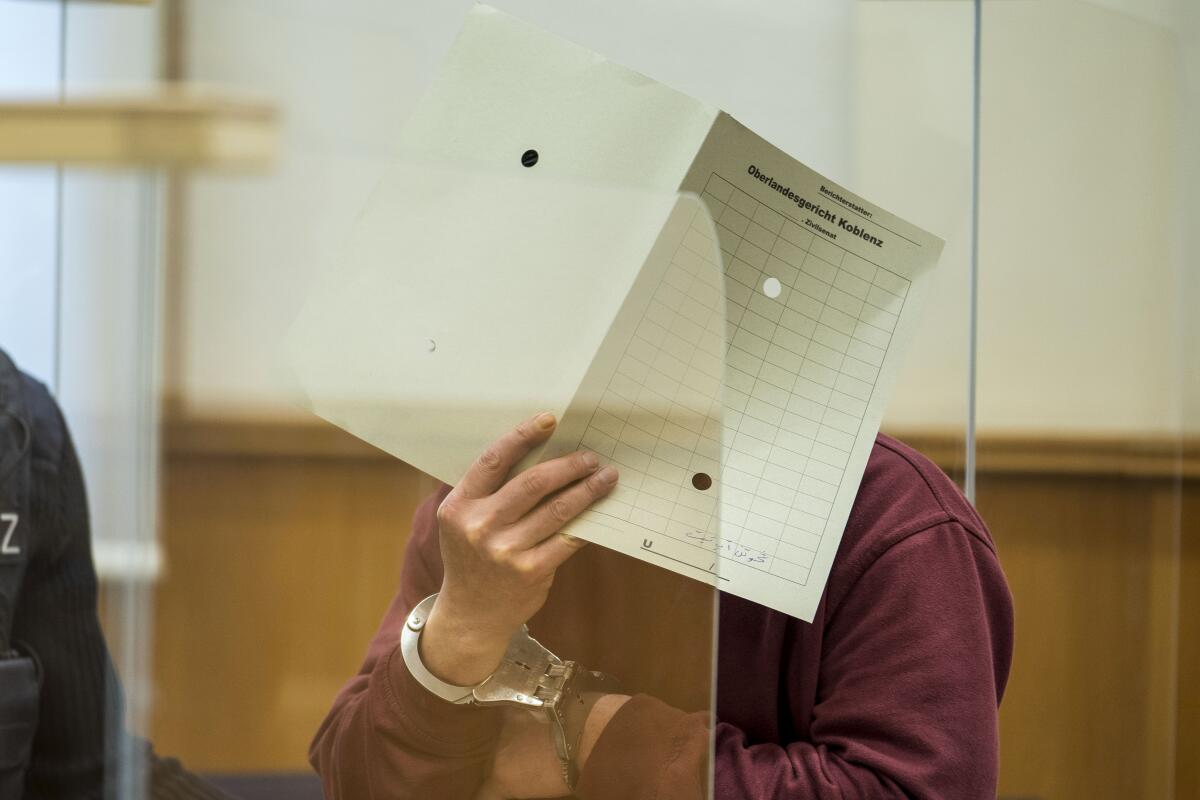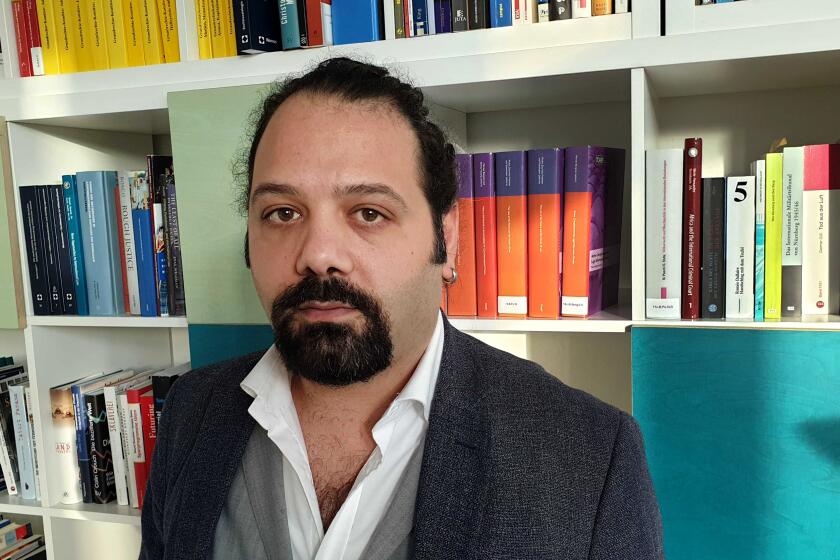In landmark case, former Syrian secret policeman convicted in Germany of aiding torture

BERLIN — A former member of Syrian President Bashar Assad’s secret police was convicted Wednesday by a German court of facilitating the torture of prisoners — a landmark ruling that human rights activists hope will set a precedent for other cases.
Eyad Gharib was convicted of being an accessory to crimes against humanity and sentenced by the Koblenz state court to 4½ years in prison, Germany’s DPA news agency reported.
It was the first time that a court outside Syria had ruled in a case alleging crimes against humanity committed by Syrian government officials. German prosecutors invoked the principle of universal jurisdiction for serious crimes to bring the case against Gharib, which involved victims and defendants who were in Germany.
The Britain-based Syrian Observatory for Human Rights said the verdict represented a “historic juncture” that would send “real messages to all those who committed war crimes and crimes against humanity against the Syrian people and gives hope to the victims and their families that right will prevail.”
The group, which has documented the decade-long civil war, urged Syrian refugees in Europe to come forward with any evidence and documents to courts to help more such cases.
Gharib could have been sentenced to more than a decade behind bars. Judges, however, were able to consider his defection and court testimony as mitigating factors.
Gharib was accused of being part of a unit that arrested people following anti-government protests in the Syrian city of Douma, a rebel bastion, and took them to a detention center known as Al Khatib, or Branch 251, where they were tortured.
The 44-year-old Gharib went on trial last year with Anwar Raslan, a more senior Syrian ex-official who is accused of overseeing the abuse of detainees at the same jail near Damascus.
Two former members of Syria’s secret police will go on trial in Germany charged with crimes against humanity.
Raslan is accused of supervising the “systematic and brutal torture” of more than 4,000 prisoners between April 2011 and September 2012, resulting in the deaths of at least 58 people. During the trial, Gharib testified against Raslan, implicating him in more than 10 prisoner deaths. A verdict in Raslan’s case is expected later this year.
The court also considered photographs of thousands of alleged victims of torture by the Syrian government. The images were smuggled out of Syria by a former police officer, who goes by the alias of Caesar.
“Today’s verdict is the first time a court has confirmed that the acts of the Syrian government and its collaborators are crimes against humanity,” said Patrick Kroker, a lawyer with the European Center for Constitutional and Human Rights, which represented multiple survivors at the trial.
“Testimony by torture survivors and intelligence officers, as well as the Caesar photos, prove the scale and systemic nature of enforced disappearances, torture and sexual violence in Syria,” he said. “The relevance of this evidence extends far beyond the proceedings in Koblenz.”
Those who rose up against the Syrian government in 2011 celebrated when armed groups pushed its forces out of parts of the country’s north.
Delivering the oral verdict, the presiding judge made it clear that Gharib’s crimes were part of the Syrian government’s systematic abuses against its own population. Syrian officials did not testify during the 60-day trial.
The court concluded that Gharib’s unit, which was under Raslan’s command, was involved in chasing down and detaining at least 30 people following a demonstration in Douma and then bringing them to the detention center where they were tortured.
Gharib, who had the rank of sergeant major until he defected, left Syria in 2013 and came to Germany in 2018. Both he and Raslan were arrested a year later.
Some rights groups have raised questions about the trial, noting that government defectors like Gharib may not realize that statements they make during asylum applications may be used against them.
News Alerts
Get breaking news, investigations, analysis and more signature journalism from the Los Angeles Times in your inbox.
You may occasionally receive promotional content from the Los Angeles Times.
Mohammad Al-Abdallah, director of the Washington-based Syria Justice and Accountability Center and a former prisoner in Syria, said Gharib was a low-ranking officer with little value in the case against him.
He suggested that putting defectors like Raslan and Gharib in prison would please the Assad government “because this will deter anyone else from defecting or joining the opposition or supplying information to human rights groups.”
But Wassim Mukdad, a Syrian survivor and co-plaintiff in Raslan’s trial, said that, although Gharib was “just one small cog in the vast Syrian torture apparatus,” the verdict against him was important.
“I hope it can shed light on all of the Assad regime’s crimes,” Mukdad said. “Only then will the trial really be a first step on this long road to justice for myself and other survivors.”
The European Center for Constitutional and Human Rights, which supports 29 survivors in the case against Raslan, of whom 14 are co-plaintiffs, is working to bring further cases against Syrian officials to trial in Germany, Austria, Sweden and Norway.
Balkees Jarrah, associate international justice director at Human Rights Watch, said the conviction of Gharib gave Syrians “some hope that this may be the beginning of a path to fuller justice.”
“Germany’s trial of two former Syrian officials for atrocities shows that it’s possible with drive and perseverance and determined prosecutors for victims to have their day in court,” she said.
“Over the last 10 months, courageous survivors have provided testimony about horrific abuses committed in Syria’s ghastly archipelago of prisons,” Jarrah said. “This case not only speaks to the role of the two suspects but also lays bare the Syrian government’s systemic torture and killing of tens of thousands of people.”
More to Read
Sign up for Essential California
The most important California stories and recommendations in your inbox every morning.
You may occasionally receive promotional content from the Los Angeles Times.











